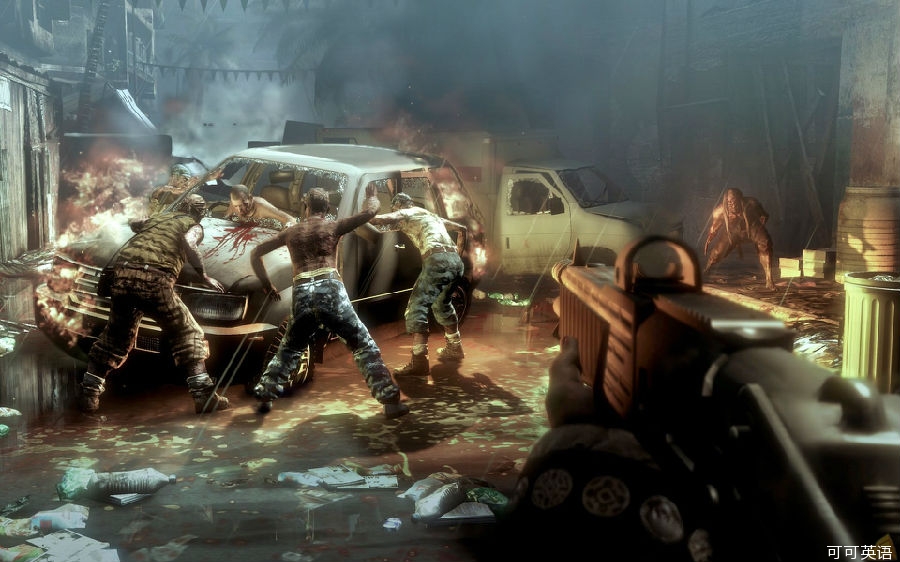
Video games, long maligned for promoting violence, may also have a good side: improving eyesight. Gory "first-person shooter" games, in which players must act quickly to kill their virtual opponents, seem to have lasting effects on a key aspect of vision, a new study shows.
長期以來,視頻游戲由于助長暴力而聲名狼藉。然而,或許視頻游戲也有其積極的一面:可以提高視力。一項新研究顯示:在血淋淋的“第一人稱射擊”類游戲中,玩家必須反應迅速才能殺死他們的虛擬對手,這似乎對于視力的一個主要方面有著持續(xù)的積極影響。
In 2002, Daphne Bavelier, a cognitive neuroscientist at the University of Rochester in New York state, found that playing action video games improved visual attention skills (ScienceNOW, 18 April 2002). This time she compared avid gamers with nongamers on a type of visual perception called contrast sensitivity. It allows people to make out objects in dim lighting and to distinguish objects from a busy background.
2002年,紐約州羅徹斯特大學的認知神經科學專家達芙妮·貝弗利爾發(fā)現(xiàn),玩視頻戰(zhàn)斗游戲可以提高視覺注意力。這次她將貪玩游戲的人和不玩游戲的人進行了對比,比較了一種被稱為“對比敏感度”的視覺指標。對比敏感度可以使人們辨認出暗淡光線中的物體,還可以使人們能夠從忙亂的背景中區(qū)分物體。
Male gamers in their late teens and 20s, Bavelier found in a pilot study, performed significantly better than nongamers in the same demographic. To determine whether video games explained this difference, she and colleagues designed a video game boot camp in which 50 adult volunteers each played 50 hours of video games over a 9-week period. Half of the participants played two first-person-shooter action games, Unreal Tournament and Call of Duty 2, in which players must quickly detect and kill enemies to avoid being killed themselves. Meanwhile, the control group played The Sims 2, a "casual" simulation game that requires a great deal of observation and strategy but at a very leisurely pace. The subjects were tested for contrast sensitivity before and after the training.
在一項初步研究中,貝弗利爾發(fā)現(xiàn):十大幾歲和20多歲的男性玩家比同一年齡段不玩游戲的男性在對比敏感度方面的表現(xiàn)要好得多。為了確定是否視頻游戲造成了這種差別,貝弗利爾和同事設計了一個“視頻游戲集中訓練營”,訓練營里的50個成年志愿者在9周的時間里每人玩50個小時的視頻游戲。其中一半?yún)⑴c者玩兩種“第一人稱射擊”類戰(zhàn)斗游戲——“虛幻競技場”和“使命召喚2”,在這兩種游戲中,玩家必須迅速地偵查出敵人并將其殺掉,才能避免自己遭到殺害;同時另外一半?yún)⑴c者玩一種叫做“模擬人生2”的游戲,該游戲是一種“隨意的”模擬游戲,玩時需要大量的觀察,并且需要講究策略,但是可以以緩慢的速度進行。在訓練之前和之后,為參與者測試了對比敏感度。
Those who played the action video games showed a roughly 50% improvement in performance on the contrast-sensitivity test, whereas the control group showed no significant improvement, the team reports this week in Nature Neuroscience. Later testing of 18 of the subjects showed that the improvement had not disappeared after several months--even though these subjects said they had not changed their video game habits. Bavelier chalks up the change to "neural plasticity "--the ability of our brains to rewire themselves to more efficiently visually process the life-or-death scenes in action video games.
研究小組在本周出版的《自然-神經學》(Nature Neuroscience)雜志上報道:在對比敏感度測試中,那些玩視頻戰(zhàn)斗游戲的人成績提高了大約50%,而對照組則根本沒有明顯的提高。后來,對其中18個受試者的進一步測試顯示:即使他們聲稱并沒有改變自己的視頻游戲習慣,但是對比敏感度的提高在幾個月之后仍未消失。貝弗利爾將這種提高歸因于“神經可塑性”——大腦神經本身一種重新連接的能力,這種能力可以使人們在視覺上更為高效地處理視頻戰(zhàn)斗游戲中那些生死攸關的場面。
"The results are convincing, " says Dennis Levi, dean of the School of Optometry at the University of California, Berkeley. "While we don't yet understand how playing action video games enhances visual processing, the very promising aspect of this is that it may provide a new method for treating patients." People with amblyopia --or "lazy eye"--suffer a severe loss of contrast sensitivity, and a regimen of action video games could complement other treatments, Levi says. The next step will be to test action video games that do not involve guns and mayhem.
“這些研究結果很令人信服,”加州大學伯克利分校視光學院院長丹尼斯·利瓦伊說,“雖說我們還不明白視頻戰(zhàn)斗游戲是如何提高視覺處理能力的,但該研究非常有前途的一個方面是它可以為病人提供新的治療方法。”利瓦伊指出:患有弱視的人們,其對比敏感度嚴重缺失,接受正規(guī)的視頻戰(zhàn)斗游戲訓練可以作為其他治療方案的補充。下一步將要對不涉及槍支和嚴重傷害的視頻打斗游戲進行測試。












